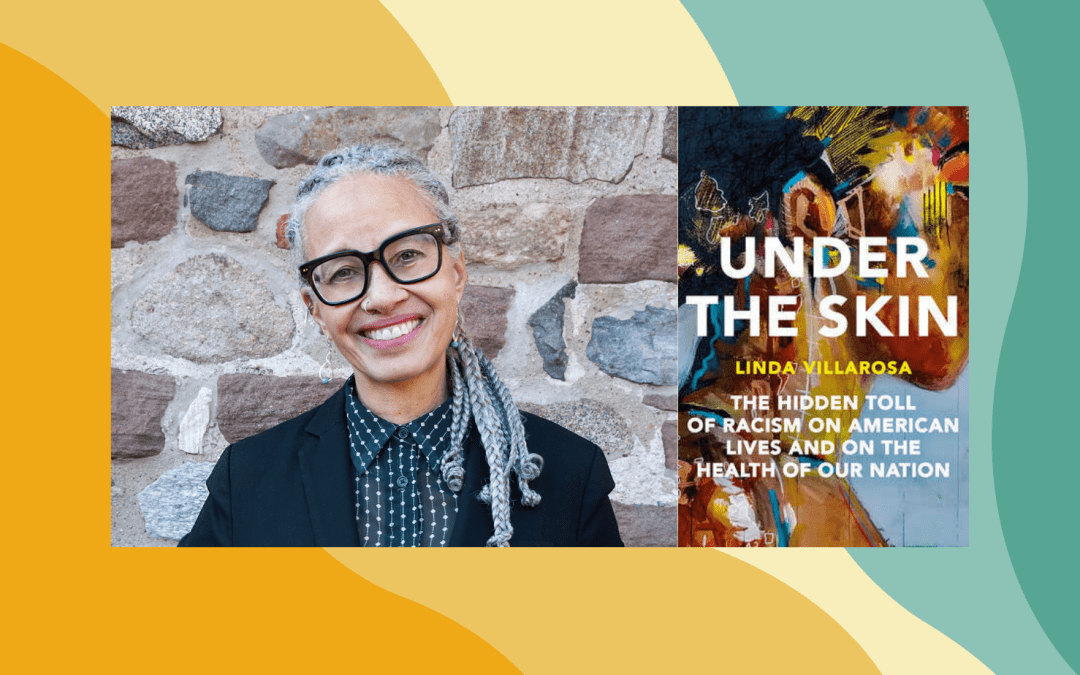Weathering (adj.): chronic stress that marginalized individuals undergo. Is connected to accelerated aging and social detriments of health. For Black Americans, it’s caused by racism.
This is one of the many reasons why many Black Americans died during the peak of the COVID-19 pandemic, as was discussed in Linda Villarosa’s Eliot Schein lecture, which detailed the intense research for her book Under the Skin: The Hidden Toll of Racism on American Lives and on the Health of Our Nation. Villarosa’s book was one of the best books of 2022, according to the New York Times.
“We live sicker and die quicker than anyone else in the country,” Villarosa said as she presented her book to Pace publishing students.
Black birthing people are three to four times more likely to die than their white counterparts.This is related to the lack of access to good and right healthcare. Villarosa explained that there is a lack of unbiased, racist healthcare, and told the story of Serena William’s birth of her daughter, Alexis Olympia Ohanian Jr.
In 2010, Williams was diagnosed with blood clots in her lungs. Since then, she’s lived in fear of them returning, and so when she birthed her daughter, she was vigilant in making sure she was on her heparin drip so she could avoid them. After vocalizing her need for the drip, her health care providers ignored her. Yet when Williams did receive a response, it was a simple “I don’t know what you need.”
William wrote in her essay for Elle:
“No one was really listening to what I was saying. The logic for not starting the blood thinners was that it could cause my C-section wound to bleed, which is true. Still, I felt it was important and kept pressing. All the while, I was in excruciating pain. I couldn’t move at all—not my legs, not my back, nothing.
I began to cough. The nurses warned me that coughing might burst my stitches, but I couldn’t help it. The coughs became racking, full-body ordeals. Every time I coughed, sharp pains shot through my wound.
…
I wasn’t coughing for nothing; I was coughing because I had an embolism, a clot in one of my arteries. The doctors would also discover a hematoma, a collection of blood outside the blood vessels, in my abdomen, then even more clots that had to be kept from traveling to my lungs.
…
In the other room, I spoke to the nurse. I told her: “I need to have a CAT scan of my lungs bilaterally, and then I need to be on my heparin drip.” She said, “I think all this medicine is making you talk crazy.” I said, “No, I’m telling you what I need: I need the scan immediately. And I need it to be done with dye.” I guess I said the name of the dye wrong, and she told me I just needed to rest. But I persisted: “I’m telling you, this is what I need.” Finally, the nurse called my doctor, and she listened to me and insisted we check. I fought hard, and I ended up getting the CAT scan. I’m so grateful to her. Lo and behold, I had a blood clot in my lungs, and they needed to insert a filter into my veins to break up the clot before it reached my heart.”
Williams suffered at the expense of healthcare racism, and she is one of the most successful Black women of her time. Her story was one of many that Villarosa shared, alongside her own struggles when she was pregnant with her own child.
Villarosa revealed that Black people are more likely to live near landfills, incinerators, highways, and other pollution-causing objects, because of redlining, which is when banks refuse loaning to someone because they live in a poor-financial risk area. Many Black Americans were forced into contract-buying, where if you couldn’t pay your mortgage, you were evicted and you lost your house. Over 3.5 billion dollars of wealth was zapped from Black communities because of this practice, and contributed to the poor health of many. Englewood was one of the many places that was redlined, with Chicago being one of the more victimized cities in America.
Through these tumultuous moments in Black history, Villarosa is confident in the future for reproductive justice. White Coats for Black Lives is an organization that fights to dismantle racism and accompanying systems of oppression in the medical field, whose core ideals are two-fold: 1) dismantling dominant, exploitative systems in the United States, which are largely reliant on anti-Black racism, colonialism, cisheteropatriarchy, white supremacy, and capitalism; and 2) rebuilding a future that supports the health and well-being of marginalized communities.
Villarosa also believes that doulas, patient navigators, and community health workers need to be institutionalized. Doulas are covered under medicaid in the state of New York. Birth partners are essential for expecting parents, as they fight for you when you can’t use your own voice.
Villarosa’s book can be purchased here.

